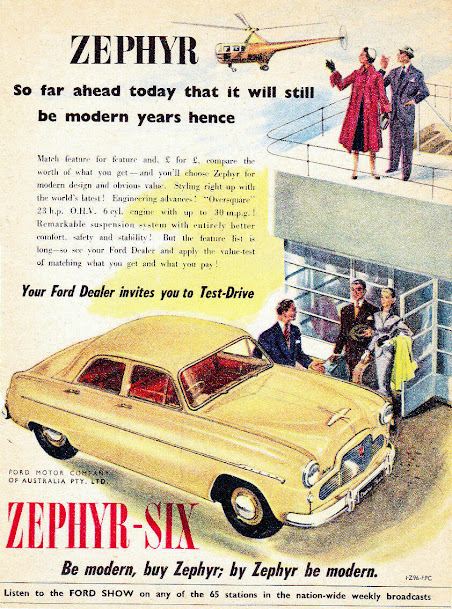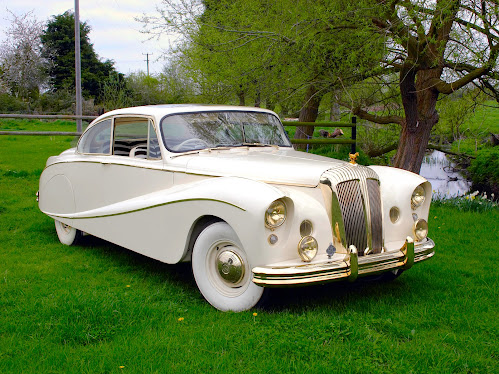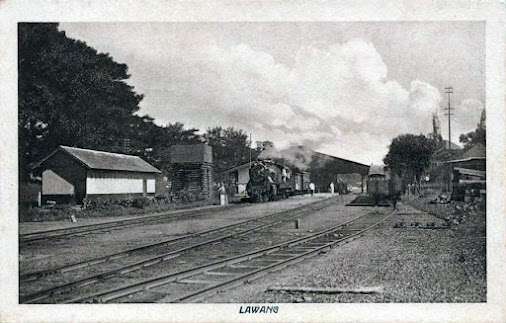Seen at Westport? One notes the "Royal Mail" painted on the front. (David Jones pic)
Thursday, August 31, 2023
Israeli diesel-electric locomotive from 1952
the NZR locomotive roundhouse at Elmer Lane, Greymouth, 1950s
A photo that would have been taken from a floodlight tower. Although the resolution quality isn't great, there look to be 13 steam locomotives present as well as a diesel shunter and a Vulcan railcar. Today the turntable remains, but the roundhouse has gone. On the right can be seen the branch line to Hokitika which continued on to Ross until 1980. For lots more, see our books. (Pic via Tom Hartill)
Wednesday, August 30, 2023
NZR ten-wheeler on the Otago Central Line, 1926
Ub 336, one of the 22 of the 4-6-0 type, seen with a goods train at the stop of Parera -- more pics and info. (AP Godber pic)
1981 Daimler Sovereign 4.2L
And not just any example, but character Arthur Daley's famous 1981 Daimler Sovereign from the hit TV series Minder. It was the car George Cole (in the photo) wanted to buy himself, and came close to doing so before it was given away in a TV Times competition. It was used in series 4,5,6 and the Christmas Special Minder on the Orient Express. The car was auctioned in 2017 with 43,990 recorded miles on the clock.
The Ford Capri equally famously driven by Daley's boxer turned bodyguard, Terry McCann (played by Dennis Waterman), was also on offer. As Arthur would almost certainly have said: "Buy the pair and from now on the world is your lobster."
Socata TB-20 Trinidad GT
steam locomotives in the Bw (motive power depot) of Gremberg, 1974
In West Germany, a few km east of Cologne with a 50 class Kriegslok in the centre (see earlier posts).
Tuesday, August 29, 2023
Monday, August 28, 2023
Sunday, August 27, 2023
Saturday, August 26, 2023
Lebako Jero station, Indonesia, 1930s
steam train at Lawang in Dutch East Indies days
The town is still called that in what is now Indonesia. Google Earth reference
Friday, August 25, 2023
Thursday, August 24, 2023
Wednesday, August 23, 2023
Milwaukee Road steeple-cab electric locomotive
One of the four Milwaukee Road class ES-2, Bo-Bo type locos from the 1910s.
From Wikipedia--
Two were built in 1916 and the final two in 1919. They were of steeplecab design, with a single roof-mounted pantograph to access the Milwaukee's 3,000 V DC overhead line. Originally numbered 10050–10053, they were renumbered E80–E83 in March 1939. The ES-2 was the Milwaukee Road's primary class of dedicated electric switchers.Electric switching on the Milwaukee Road was always limited to the Rocky Mountain Division, and to the middle and east end only, Avery being merely a power change, rather than a switching, location. Harlowton's switching demands eventually exceeded the capabilities of the ES-2, which was replaced in 1951 by a single GE Freight Motor (later reclassed ES-3) instead; thus from the 1950s to the 1970s the ES-2s were normally used only in the greater Butte area, in which the Deer Lodge shops were also located. The Coast Division eschewed electric switchers entirely, as its operating characteristics and economics were more favorable to otherwise underutilized steam (later diesel) switchers which also served the Milwaukee's non-electrified branches in the area.
In addition to the pantograph, the ES-2s were equipped with a wooden trolley pole which was spring-tensioned and manually-operated, in the same manner as on a trolley car, though it was never meant for use while in motion. Its sole purpose was to make stationary contact with the wire to charge an empty air compressor enough to raise the air-operated pantograph, usually when making a black start after dead storage or maintenance. For this reason, the pole was tipped with a metal plate rather than a shoe or trolley wheel.
much nicer metro stations in Russia
https://twitter.com/jacksonhinklle/status/1693760132079869984?s=20

















































